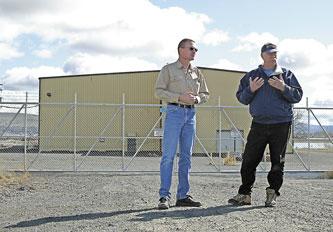|
http://www.heraldandnews.com/articles/2007/03/21/news/local_news/local1.txt
City may seek loan for biofuels project
 |
 |
H&N photo by
Andrew Mariman
Eric Anderson, left, the CEO of
Evergreen Bio-fuels of America Inc.
and Brent Budden, a director of
Evergreen, stand on the grounds of
what could be Klamath's first
biodiesel and ethanol plant.
|
|
March 21, 2007 Herald
and News
The City of Klamath Falls is considering
borrowing $2 million from the state to help a
company build a biofuels plant that would
employ 23 workers and contract with area
potato and sugar beet growers.
City council members
said Monday they would study details of the
deal presented by Evergreen Bio-fuels of
America, before lending support to the
$6-million plant.
State involvement
The $2 million loan
would come from the Oregon Economic Community
Development Department, said City Manager Jeff
Ball. It would be used to purchase the former
FINI Enterprises building on Mallard Lane near
Klamath Memorial Park.
The plant would be developed at the site and
produce biodiesel and ethanol. Both are
alternative energy sources made from organic
matter.
Six Klamath Falls residents form Evergreen's
board of directors. Eric Anderson, a 1985
Oregon Institute of Technology graduate, is
its CEO. Other directors are Charlie Swift,
Randy Shaw, Brent Budden, Harold Hartman and
Diane Spires.
The city's support would help financially and
could be used by Anderson and his business
partners to raise additional capital,
officials say.
Proposal like others
“The proposal is not unlike what we did with
NEW Corporation,” Ball said, referring to the
company operating on a site north of Oregon
Institute of Technology. It now employs 650
people.
Anderson said
the rest of the money needed would come from
investors and other government sources.
“Approximately $2.5
million would come from investors, most of
whom we hope to recruit from within the area,”
he said. “That would give us greater control
over the operation of the plant and would mean
more jobs.”
The remaining $1.4 million is expected to come
from a state-based loan program, a USDA rural
development grant and conventional business
loans and venture capital.
Council members scheduled a study session on
the issue next week.
If everything goes as
planned, Anderson said the plant could begin
operating this fall, producing one million
gallons of biodiesel. Ethanol production could
start as early as October, he said, adding
that long-term plans include expanding
production to 25 million gallons biodiesel and
six million gallons of ethanol per year.
-Gerry Baksys |

